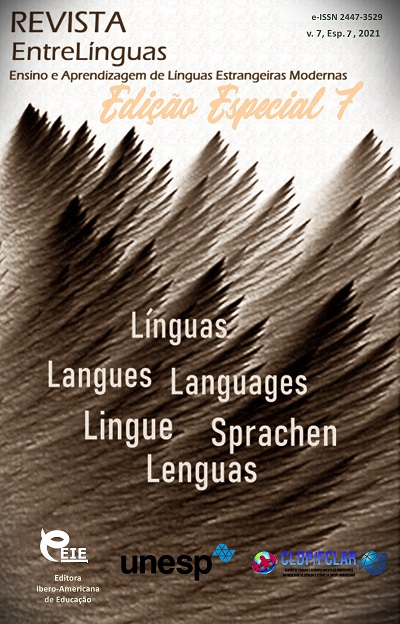Linguistic aspects of the image of spartan king Leonidas in the culture of the early modern periods
DOI:
https://doi.org/10.29051/el.v7iesp.7.16267Keywords:
History, Reception studies, European culture, Linguistic aspectsAbstract
The article aims to study the linguistic aspects of the history in European culture through the example of the life and image of Spartan king Leonidas. To meet the aim of the study, the methods applied to the given issue is through culture, language, and history, through the key concept of social and cultural reception of the antiquity. The image of King Leonidas in the European culture is determined by social and cultural conditions in which the need for refreshing the events of the Vth century B.C. has appeared. Anti-tyrannical ideas and the cult of freedom as opposed to slavery inspired the artists of XVII XVIII. centuries. The image of king Leonidas is present in the European culture and linguistic characteristics at the end of the XIX and the first half of the XX centuries revived due to world wars.
Downloads
References
Bayliss, A. J. (2020). The Spartans. Oxford University Press, USA. Calame, C. (2017). Pre-‐Classical Sparta as Song Culture. A
Christien, J., & Le Tallec, Y. (2013). Léonidas. Histoire et mémoire d’un sacrifice. P.: Ellipses.
Companion to Sparta, 177-201. https://doi.org/10.1002/9781119072379.ch7
Glover, R. (1882). The Poems British Poets. Vol. LXIX. Chiswick.
Hugo, V. (1956). “Tri sotni” [The three hundreds] Polnoe sobranie sochneniy v 15tomah, tom 13 [The complete works in 15 vol., vol.13.] Moscow: SPHF (in Russian).
Jung, S. (2008). David Mallet Anglo-Scot Poetry, Patronage, and Politics in the Age of Union. Newark: University of Delaware Press.
Lord Byron (1812). Polomnichstvo Charl’d Garol’da” [Childes Harold’s Pilgrimage] Available at: http://lib.ru/POEZIQ// BAJRON/child.txt (in Russian).
Manfredi, V.M. (1988). Lo scudo di Talos. Milano. Arnoldo Mondadori Editore S'p'A'I edizione Bestsellers Oscar Mondadori aprile 1990. Available at: https://amplio.belluzzifioravanti.it/ pluginfile.php/104211/mod_resource/content/1/LO%20 SCUDO%20DI%20TALOS.pdf. (in Italian).
Mayakovsky, V.V. (1978). “Rossia. Ickusstvo, My” [Russia. Art. We.] Polnoe sobranie sochneniy v 12 tomah, tom 11 [The complete works in 12 vol, vol.11] (in Russian).
Montaigne, M. (1992). “Opyty” [Of experience]. Vol.1, Moscow: Golos (in Russian)
Müller, L.W. (1822). Lieder der Griechen“. 2 Helf. Dessau: C.G. Ackerman (in German).
Pushkin, A.S. (1979). “Pis’ma [Letters]”. Polnoe sobranie sochneniy v 10 tomahT. 10 [The complete works in 10 vol, vol.10]. Leningrad: Nauka (in Russian).
Saado, K. H. (2020). Sub-humanising The Others: Cross-Cultural Reception of Films., Iranian/Western Interpretation of Snyder’s 300. Journal of University of Raparin, 7(3), 369-385.
Downloads
Published
How to Cite
Issue
Section
License

This work is licensed under a Creative Commons Attribution-NonCommercial-ShareAlike 4.0 International License.
Os manuscritos aceitos e publicados são de propriedade da Revista EntreLínguas. Os artigos publicados e as referências citadas na Revista EntreLínguas são de inteira responsabilidade de seus autores.
Transferência de direitos autorais – autorização para publicação
Caso o artigo submetido seja aprovado para publicação, já fica acordado que o(s) autor(es) autoriza(m) a UNESP a reproduzi-lo e publicá-lo na EntreLínguas, entendendo-se os termos “reprodução” e “publicação” conforme definição respectivamente dos incisos VI e I do artigo 5° da Lei 9610/98. O artigo poderá ser acessado pela rede mundial de computadores (Internet), sendo permitidas, a título gratuito, a consulta e a reprodução de exemplar do artigo para uso próprio de quem a consulta, desde que haja a citação ao texto consultado. Essa autorização de publicação 328 EntreLínguas, Araraquara, v. 1, n .2, p. 323-328, jul./dez. 2015 não tem limitação de tempo, ficando a UNESP responsável pela manutenção da identificação do(s) autor(es) do artigo. Os artigos publicados e as referências citadas na Revista EntreLínguas são de inteira responsabilidade de seus autores.











